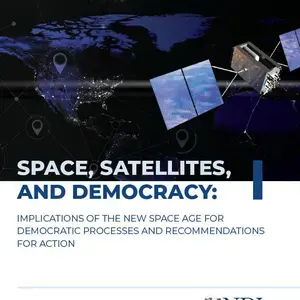For media inquiries, please contact Paulina Chavez [email protected].
In a democracy, power is derived from the consent, collective will and inclusion of the people. In today's rapidly evolving technological landscape, developments such as Generative Artificial Intelligence (Gen AI) can force an examination of the fundamental aspects of power and how these changes may help or hinder democracy. The world is just beginning to feel the societal and political impact of gen AI but it is critical to recognize it for the transformational power that it is, while also acknowledging the need for responsible and ethical use to safeguard democratic processes and societal well-being.
GenAI, characterized by its ability to create original content such as text, images, or videos based on training data, represents a significant departure from traditional AI's focus on data analysis and pattern recognition. When new tools were introduced that showcased the potential of GenAI, NDI was quick to join the efforts of researchers, implementers and civil society to scrutinize systems, test models driving products, and meet with technological leaders to understand how this would impact democratic actors around the world. This effort capitalized on NDI’s decades long history of working to harness technology to enhance democracy and leading global efforts to institute responsible and ethical use around critical democratic moments such as elections, transitions of power, or constitutional reform and to enhance engagement among political leaders and the people.
GenAI tools raise the same fundamental questions about data privacy, transparency, regulation, and deployment and impact that NDI has identified around past waves of new technology. At the same time, they offer the potential to enhance democratic processes, thus posing both threats and opportunities.
One of the foremost threats posed by GenAI is the exacerbation of the digital divide, with billions of people worldwide still lacking access to the internet and the technical expertise necessary to engage with GenAI technologies. In many locations in which NDI works, the power required to house complex machine learning technologies simply isn't available. GenerativeAI is likely to exacerbate the existing digital haves and have nots. Moreover, authoritarian regimes may exploit GenAI for surveillance and suppression of human rights, and develop systems outside of existing human rights standards that undermine inclusion, participation, accountability, and other democratic values. Certainly the most visible concern is the proliferation of AI-generated content which is already being used to undermine public trust in information sources and further erode the foundations of democratic discourse, especially during critical democratic moments. These are challenges democracies must confront robustly and in concert.
GenAI may also offer significant opportunities to enhance government services, and promote transparency to allow for tracking of illicit financial flows to counter corruption. Where systems are available, it can build efficiencies for under resourced civil society organizations that allow for larger scale targeted outreach within communities. Promising applications allow for broader inclusion of persons with disabilities in civic life. GenerativeAI’s ability to predict shocks such as climate disasters can help governments mitigate harms. Consistent with NDI’s approach to all technology, NDI advocates for a "Do No Harm" approach to GenAI, rooted in democratic principles, and emphasizes the need for contextual sensitivity to address diverse cultural perspectives and promote access and inclusion.
At the core of the concern about GenerativeAI and democracy is the concentration of power. Too few individuals, companies and governments have the ability to train, manipulate and deploy these systems. Although these discussions are underway, they are happening largely without the input of the people it will most impact around the world.
Democratic governments and democracy advocates must not miss this moment in governing GenAI to ensure it delivers increased, not diminished values and rights. Unlike past technological advancements, NDI is heartened that governments are acting swiftly to develop multi stakeholder frameworks and educational initiatives to prepare communities for the transformative impacts of GenAI. Civil society actors around the world are cataloging and researching early impacts. This proactive approach includes prioritizing research and development of responsible regulations, constraining gender and identity bias, enhancing media literacy and education, empowering civil society to hold governments accountable using GenAI tools, and fostering ethical guidelines for AI use in politics. It is critical that these issues are not concentrated in the Global North. This will require diligence and attention, and NDI is prepared to help our partners meet the moment by continuing our work in this area.
Ultimately, NDI envisions a future where GenAI enhances rather than undermines democracy, enabling governments, organizations, and individuals to harness its potential for the collective benefit of society. In this sense, innovation and inclusion go hand in hand. By promoting responsible and inclusive approaches to GenAI governance and development, NDI will work to ensure that the benefits of technological innovation enhance the full participation of all people in determining their future.



